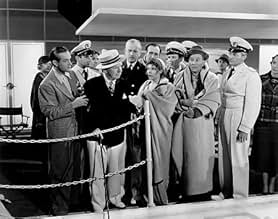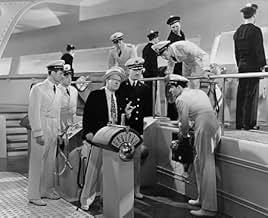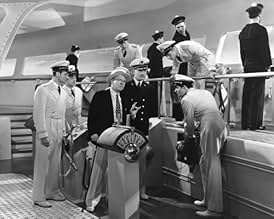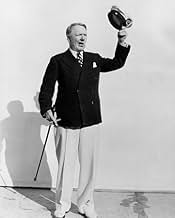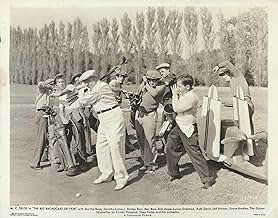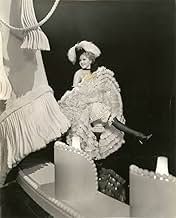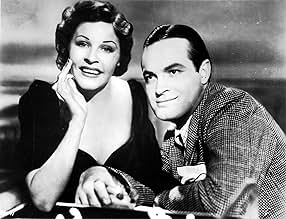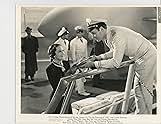AVALIAÇÃO DA IMDb
6,1/10
1,1 mil
SUA AVALIAÇÃO
Adicionar um enredo no seu idiomaThe Bellows family causes comic confusion on an ocean liner, with time out for radio-style musical acts.The Bellows family causes comic confusion on an ocean liner, with time out for radio-style musical acts.The Bellows family causes comic confusion on an ocean liner, with time out for radio-style musical acts.
- Direção
- Roteiristas
- Artistas
- Ganhou 1 Oscar
- 5 vitórias no total
Leif Erickson
- Bob Hayes
- (as Leif Erikson)
Virginia Vale
- Joan Fielding
- (as Dorothy Howe)
Avaliações em destaque
If The Big Broadcast of 1938 is remembered today it's for the fact that it introduced Bob Hope in his first feature film and at the same time gave him his theme song Thanks for the Memory. Hope was billed fifth in this production behind W.C.Fields, Martha Raye, Dorothy Lamour, and Shirley Ross.
It was in fact a Fields film, but it was also to be Fields's last film for Paramount and everyone knew it. Though there are some flashes of typical Fields humor, basically Fields staggers through the role, a dual role in fact of two brothers, owners of a transatlantic steamship line.
The very thin plot of this film is the fact that two big luxury liners are in a race from New York to Cherbourg with a lot of money in various bets on the race. In fact that's where Bob Hope's money is, tied up in wagers. If he loses, his three ex-wives are going to clobber him with alimony, the three former spouses being Shirley Ross, Dorothy Lamour, and Grace Bradley.
All three are on board one of the liners with Hope who's a broadcaster and will be broadcasting the race on a worldwide hookup.
Of course the plot is simply a convenience to allow a lot of talented people to show their stuff and they do. Besides Thanks for the Memory, Dorothy Lamour has a very nice song in You Took The Words Right Out Of My Heart which she sings to aspiring inventor Leif Erickson.
Thanks for the Memory is sung here and later recorded as a duet by Bob Hope and Shirley Ross. Ms. Ross's part in introducing what became the Oscar winning Best Song of 1938 is usually forgotten. Shirley Ross is also undeservedly forgotten herself today. She had a pleasing screen personality, a bit like Alice Faye and a good way with a lyric, just like Faye. Leo Robin and Ralph Rainger wrote Thanks for the Memory, probably the biggest hit that songwriting team ever had.
The Big Broadcast of 1938 was the last in a series of Big Broadcast films. By then I guess radio wasn't such a novelty gimmick to weave a film around. The first Big Broadcast gave Hope's lifetime rival, Bing Crosby, his first feature film starring role.
The film is part of an era of wonderful nonsense on the screen that was never concerned with any message of significance, just with providing the public with good entertainment. And with the cast of this film, it's guaranteed to be good entertainment.
It was in fact a Fields film, but it was also to be Fields's last film for Paramount and everyone knew it. Though there are some flashes of typical Fields humor, basically Fields staggers through the role, a dual role in fact of two brothers, owners of a transatlantic steamship line.
The very thin plot of this film is the fact that two big luxury liners are in a race from New York to Cherbourg with a lot of money in various bets on the race. In fact that's where Bob Hope's money is, tied up in wagers. If he loses, his three ex-wives are going to clobber him with alimony, the three former spouses being Shirley Ross, Dorothy Lamour, and Grace Bradley.
All three are on board one of the liners with Hope who's a broadcaster and will be broadcasting the race on a worldwide hookup.
Of course the plot is simply a convenience to allow a lot of talented people to show their stuff and they do. Besides Thanks for the Memory, Dorothy Lamour has a very nice song in You Took The Words Right Out Of My Heart which she sings to aspiring inventor Leif Erickson.
Thanks for the Memory is sung here and later recorded as a duet by Bob Hope and Shirley Ross. Ms. Ross's part in introducing what became the Oscar winning Best Song of 1938 is usually forgotten. Shirley Ross is also undeservedly forgotten herself today. She had a pleasing screen personality, a bit like Alice Faye and a good way with a lyric, just like Faye. Leo Robin and Ralph Rainger wrote Thanks for the Memory, probably the biggest hit that songwriting team ever had.
The Big Broadcast of 1938 was the last in a series of Big Broadcast films. By then I guess radio wasn't such a novelty gimmick to weave a film around. The first Big Broadcast gave Hope's lifetime rival, Bing Crosby, his first feature film starring role.
The film is part of an era of wonderful nonsense on the screen that was never concerned with any message of significance, just with providing the public with good entertainment. And with the cast of this film, it's guaranteed to be good entertainment.
There are momentary gems in this movie, and I recently bought the DVD because I fondly remembered it from its television broadcasts during my childhood. Hope and Ross's "Thanks for the Memory" (that's the actual spelling; it isn't plural) is so well portrayed that it seems they are recalling actual moments from their lives. This is almost the only moment of sincerity in this otherwise farcical fluff-piece. Martha Raye's "Oh, Mama!" is eye-popping primarily because I believe she did her own stunts in it, and she is bandied about like an unlucky mouse caught by a gruesomely playful puss. WC Fields sparks frequent smirks with his ostentatious manner combined with total buffoonery. Dorothy Lamour is only pleasant; I don't believe she had yet found her spark for comedy that was later displayed in the Hope & Crosby Road Movies. Her song (she only gets one but sings it ad infinitum to Leif Erickson), along with the remainder of the musical score, is surprisingly engaging. All in all an enjoyable musical comedy review, designed so audiences could finally see the faces of the performers they invited into their living rooms through the radio.
One must have at least a passing familiarity with the 1930s to understand and/or enjoy "The Big Broadcast of 1938". Without that, the movie is a curio piece to be remembered only as Bob Hope's first major film appearance and the one where he first sang "Thanks for the Memory" (soon to be his theme); W.C. Fields's last film for Paramount; and, perhaps if you're of a certain age, Martha Raye and Dorothy Lamour.
"The Big Broadcast of . . . " series of films were strictly pastiche: an odd mixture of familiar film faces, radio personalities, and vaudeville, burlesque and novelty acts with an extremely loose storyline stringing it all together. For 10¢ and the B-picture with an A-picture double-bill, the movie would have hit the spot for most Depression-era movie-goers.
The humour and jokes are pretty period specific, making the movies already out-of-date even ten years later. Without a map and a compass, the territory would be unfamiliar to audiences 70 years later. But that's not unique to "The Big Broadcast of . . . " series either. How well will "Canonball Run", "Airplane", "Scary Movie" and "Meet the Spartans" (all products of their time) hold up in 70 years? As others have stated, the best segment of the film is Hope and Shirley Ross singing the very tender and bittersweet, "Thanks for the Memory". Don't expect much from "The Big Broadcast of 1938", view it as the mind-candy of your great-, grand- or parents' generation.
"The Big Broadcast of . . . " series of films were strictly pastiche: an odd mixture of familiar film faces, radio personalities, and vaudeville, burlesque and novelty acts with an extremely loose storyline stringing it all together. For 10¢ and the B-picture with an A-picture double-bill, the movie would have hit the spot for most Depression-era movie-goers.
The humour and jokes are pretty period specific, making the movies already out-of-date even ten years later. Without a map and a compass, the territory would be unfamiliar to audiences 70 years later. But that's not unique to "The Big Broadcast of . . . " series either. How well will "Canonball Run", "Airplane", "Scary Movie" and "Meet the Spartans" (all products of their time) hold up in 70 years? As others have stated, the best segment of the film is Hope and Shirley Ross singing the very tender and bittersweet, "Thanks for the Memory". Don't expect much from "The Big Broadcast of 1938", view it as the mind-candy of your great-, grand- or parents' generation.
This movie is very dear to me. I saw it on late-night TV when I was about 12 years old, tape-recorded the sound track and listened to it over and over again. This is a movie that has everything: wacky W. C. Fields bits like his golf and pool routines, Bob Hope bombing out with the crowd on the ship (imagine, in his first movie role he can't even raise a laugh!), bizarre but charming performers like Shep Fields with his Rippling Rhythm orchestra (whom Lawrence Welk obviously ripped off), accompanied by an even more bizarre animated segment.
It's almost like watching a '30s stage revue of really gifted and varied performers, including a Mexican singer so beautiful he must be gay, and Martha Raye doing her foghorn bit. But the crowning glory of this film is the funny and poignant duet, Thanks for the Memory, with Bob Hope and Shirley Ross.
Most people know the tune as Bob's theme song, but few know the clever, tender, almost Dorothy Parker-like lyrics. This is the story of a sophisticated but madcap couple, not unlike Nick and Nora Charles, running through money like water, traveling the world, and finding bliss in bed. Each verse tells a little bit more of their story in an arch, clever way that is never too trite because of Shirley Ross's marvelous acting. Her facial expressions reveal the deeper story underneath the actual events, a couple who were madly in love but stormy and tempestuous, with fights that may have included screaming and hair-pulling.
Shirley makes reference to "the night you came home with lipstick on your tie", making it sound like an uproarious joke, while Bob rolls his eyes in discomfort. He sings of "that weekend in Niagara when we hardly saw the falls," and Ross murmurs, "How lovely that was." "Thank you," Bob replies.
This is a fresh and sensitive take on what could be a very sentimental song, and I can never see it without tearing up at the end. This movie is worth renting or buying, if you can find it, as a great example of '30s entertainment with the bonus of a truly great "love-lost" song.
It's almost like watching a '30s stage revue of really gifted and varied performers, including a Mexican singer so beautiful he must be gay, and Martha Raye doing her foghorn bit. But the crowning glory of this film is the funny and poignant duet, Thanks for the Memory, with Bob Hope and Shirley Ross.
Most people know the tune as Bob's theme song, but few know the clever, tender, almost Dorothy Parker-like lyrics. This is the story of a sophisticated but madcap couple, not unlike Nick and Nora Charles, running through money like water, traveling the world, and finding bliss in bed. Each verse tells a little bit more of their story in an arch, clever way that is never too trite because of Shirley Ross's marvelous acting. Her facial expressions reveal the deeper story underneath the actual events, a couple who were madly in love but stormy and tempestuous, with fights that may have included screaming and hair-pulling.
Shirley makes reference to "the night you came home with lipstick on your tie", making it sound like an uproarious joke, while Bob rolls his eyes in discomfort. He sings of "that weekend in Niagara when we hardly saw the falls," and Ross murmurs, "How lovely that was." "Thank you," Bob replies.
This is a fresh and sensitive take on what could be a very sentimental song, and I can never see it without tearing up at the end. This movie is worth renting or buying, if you can find it, as a great example of '30s entertainment with the bonus of a truly great "love-lost" song.
The trans-Atlantic race is on between the two great ocean liners, the Colossal and the Gigantic. On board the Gigantic (or is it the Colossal? Not even all of the passengers are sure) is an assortment of characters who present us with a sort of variety show over the course of the voyage:
The plot is an uneven mishmash, but some good songs stand out. Lamour sings "You Took the Words Right Out of My Heart," a lovely ballad. Raye does one called, "Mama, That Moon Is Here Again," which builds into a wild acrobatic dance in which sailors toss Martha all around the deck. The performance by Hope and Ross of "Thanks for the Memory" is truly excellent—it's a bittersweet song that we all know and yet it actually means something in its context of two old lovers hashing over regrets and falling back in love. It's a wonderfully touching and low key performance.
In between these highlights is a lot of nonsense, some of it amusing. The plot doesn't exactly buzz along—it stops and starts too much before ultimately drawing to a rather hasty resolution at the end of the voyage. It is kind of like of a big broadcast, a radio all star variety program, I suppose. Taken as a whole, it's really not that great a picture—but it's certainly worth seeing for the sake of its numerous highlights.
- W.C. Fields, ship's owner. He stops on the way to the pier for a game of golf ("Stand clear, keep your eye on the ball," he tells his large team of caddies) and so has to catch up with the ship by flying in on his mini-helicopter. He's nuts. He has a daughter...
- Martha Raye: According to pop Fields, "She's an unfortunate girl .Seven years ago, she crashed an aeroplane in a mirror factory. Broke 9,831 mirrors."
- Bob Hope: A radio announcer broadcasting updates on the race, he is accompanied on the journey by his three ex-wives, who intend to prevent prospective wife number four from cutting into their alimony checks ("She can't chisel me down to any 25%....").
- Dorothy Lamour, who has second thoughts about becoming that fourth wife when she meets
- Leif Erickson, handsome and brilliant young engineer who has designed the special propulsion system for the ship.
- Shirley Ross, one of the ex-wives. She and Hope get to chatting and can't quite remember why they ever divorced in the first place.
The plot is an uneven mishmash, but some good songs stand out. Lamour sings "You Took the Words Right Out of My Heart," a lovely ballad. Raye does one called, "Mama, That Moon Is Here Again," which builds into a wild acrobatic dance in which sailors toss Martha all around the deck. The performance by Hope and Ross of "Thanks for the Memory" is truly excellent—it's a bittersweet song that we all know and yet it actually means something in its context of two old lovers hashing over regrets and falling back in love. It's a wonderfully touching and low key performance.
In between these highlights is a lot of nonsense, some of it amusing. The plot doesn't exactly buzz along—it stops and starts too much before ultimately drawing to a rather hasty resolution at the end of the voyage. It is kind of like of a big broadcast, a radio all star variety program, I suppose. Taken as a whole, it's really not that great a picture—but it's certainly worth seeing for the sake of its numerous highlights.
Você sabia?
- CuriosidadesBob Hope's big break in feature films occurred after Jack Benny turned down this role.
- Erros de gravaçãoNear the end of the movie the helmsman said that the S.S. Gigantic was diesel powered. That would mean that the liner's proper name would be MV (Motor Vessel) Gigantic as opposed to SS (Stream Ship) Gigantic.
- Citações
First reporter: Say, do you know anything about electricity?
S.B. Bellows: My father occupied the chair of applied electricity at State Prison.
- ConexõesFeatured in Hollywood and the Stars: The Fabulous Musicals (1963)
- Trilhas sonorasThis Little Ripple Had Rhythm
(uncredited)
Music by Ralph Rainger
Performed by Shep Fields and His Rippling Rhythm Orchestra
Principais escolhas
Faça login para avaliar e ver a lista de recomendações personalizadas
- How long is The Big Broadcast of 1938?Fornecido pela Alexa
Detalhes
- Data de lançamento
- País de origem
- Idioma
- Também conhecido como
- Ondas Musicais de 1938
- Locações de filme
- Eastern Service Studios, Astoria, Queens, Nova Iorque, Nova Iorque, EUA(sequence: Kirsten Flagstad aria)
- Empresa de produção
- Consulte mais créditos da empresa na IMDbPro
- Tempo de duração1 hora 31 minutos
- Cor
- Proporção
- 1.37 : 1
Contribua para esta página
Sugerir uma alteração ou adicionar conteúdo ausente

Principal brecha
By what name was Folia a Bordo (1938) officially released in India in English?
Responda
